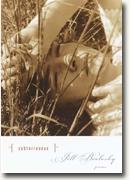Subterranean: Poems
Jill Bialosky
book reviews:
· general fiction
· chick lit/romance
· sci-fi/fantasy
· graphic novels
· nonfiction
· audio books
· author interviews
· children's books @
curledupkids.com
· DVD reviews @
curledupdvd.com
newsletter
win books
buy online
links
home
for authors
& publishers
for reviewers

 |
Subterranean: Poems Jill Bialosky Knopf Paperback 96 pages February 2003 
|
|
Like Persephone in the myth, the child represents "the dark un-/tamed place, like thicket in a neglect-/ed wood where I fall to after each new/ loss". In "Landscape with Child," the poet announces, "Here I am for once on the other side." Even mothers who have their children, however, are in danger. In "Thanksgiving Primer," the poem expresses guilt over leaving her child breifly unattended and in danger, much like Demeter. Subterranean also views the situation from the other side of the myth. The poems are filled with desire and temptation. In the poem "In the Fall, "desire was indistinguishable from suffering." In "Raping the Nest," the young girl steals robin's eggs, rationalizing "because there was a boy I desired/I did not care what would live or die or one day/ fly into the air like the soul released from the body." The landscape in the poems are always bleak, a fact that, in itself, echoes the Persephone myth--Demeter's withholding of spring while her daughter remained in the underworld. In "Pumpkin Picking," the poet notices that "loss penetrates every aspect of landscape." While Bialosky's style is quite minimal in its utilizaton of short, clean lines, at times, the stanzas are flowing and prose-like. The poet uses the Demeter myth with skill and poignancy, interweaving it with the everyday details of female life. Each poem resonates with the chill of the subterranean world she has created, a world of the living and the dead. © 2002 by Kristy Bowen for Curled Up With a Good Book |
| Also by Jill Bialosky: |
|
|
|
 Click here to learn more about this month's sponsor! |
|
| fiction · sf/f · comic books · nonfiction · audio newsletter · free book contest · buy books online review index · links · · authors & publishers reviewers |
|
| site by ELBO Computing Resources, Inc. | |
 Quite beautifully, the poet examines the dual states of motherhood, both
having a child and losing one. The early poems in the book focus
primarily on loss. In "Torture," the speaker faces the pain of
miscarriage, admitting "by then/there was no baby/to bring home/and we
could no longer/ live in the place/ she was conceived." In "Shadow Life,"
she mourns the "child between us,/the embryonic/nut floating/lost and
unattached." In "Pumpkin Picking," "it's as if the souls of our lost
children have entered this graveyard/ where in a month's time the fields
will be picked over, pumpkins splayed/ open, smashed, left to rot."
Quite beautifully, the poet examines the dual states of motherhood, both
having a child and losing one. The early poems in the book focus
primarily on loss. In "Torture," the speaker faces the pain of
miscarriage, admitting "by then/there was no baby/to bring home/and we
could no longer/ live in the place/ she was conceived." In "Shadow Life,"
she mourns the "child between us,/the embryonic/nut floating/lost and
unattached." In "Pumpkin Picking," "it's as if the souls of our lost
children have entered this graveyard/ where in a month's time the fields
will be picked over, pumpkins splayed/ open, smashed, left to rot."